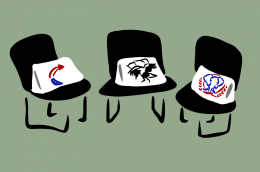
On Feb. 3, the Frances Beal Society released an audio recording of what they say is a meeting between members of Binghamton University’s chapters of Turning Point USA (TPUSA), College Republicans and the Binghamton Review via Twitter — a recording that includes threatening remarks against students and student groups.
The audio clip was reportedly taken on Nov. 21, 2019, just days after demonstrators protested TPUSA and College Republicans on the Spine and later protested an event featuring economist Arthur Laffer. It includes comments like, “We got to just keep it going; honestly, I’m having too much fun,” “Honestly, if they jump me, big money,” “We go after them” and “Scorched earth! Kill them! Get them!” These comments illustrate how little respect the members of the groups supposedly speaking in the audio have for important issues at our University. Instead, they ridicule those protesting against them as if their concerns are meaningless except as a method for TPUSA to garner more support and funding from the online hysteria that typically follows their grossly inaccurate depiction of the events they incite. It goes without saying that it does not matter whether these comments were said in jest or not — implying that any student should be killed goes far beyond crossing the line of what is acceptable from individuals at this University.
Additionally, although Pipe Dream could not independently verify the testimonies described by the Frances Beal Society, multiple students from the protests have reportedly said they were harassed by members of these organizations. According to the Frances Beal Society, these students did not report these threats to the Binghamton Police Department (BPD), Binghamton’s New York State University Police (UPD) or the University because they believe that these institutions wouldn’t do anything to help them. This is far from the first time students — particularly students of color — have felt the University has failed to step in when they are in danger. Incidents such as threats made against the X-Fact’r dance group in the city of Binghamton and engineering professor Victor Skormin’s racist emails and social media posts serve as examples of how the University has not adequately supported the safety and well-being of its students of color. That students continue to feel they would not receive assistance from the University is cause for them to review their policies on handling matters of harassment and threats against their students.
In addition to the recording, leaked messages suggested that TPUSA would sue the Student Association (SA) if they were denied a charter, claiming it would be an infringement on their freedom of speech. Charters are not given to student organizations as a pass for free speech; rather, they are a way of providing organizations with a greater means to campus facilities and funding. TPUSA and other unchartered organizations are free to exercise their right to freedom of speech without a charter, so as long as they comply with the rules of operating respectfully in a public space. There is a difference, however, between expressing different views and making careless threats against the lives of those with other opinions. TPUSA is a group that continually seeks to generate a reaction. In September 2017, a University of Nebraska lecturer was reassigned after a video of her confronting a TPUSA student recruiting on campus was posted online. The lecturer received threats to her life. Just a year later, in October 2018, TPUSA members at Florida International University were caught sharing racist jokes and memes. There are many more examples of TPUSA’s harmful tactics at other college campuses across the country.
Although it is currently unclear if the individuals in the recording were speaking in the capacity of group leaders, those who were in the recording are reportedly in leadership positions in TPUSA, College Republicans and the Binghamton Review. SA President Emma Ross wrote in an email that student groups can only face disciplinary action if those in the audio leak are speaking as representatives of their respective organizations. This, however, should be no obstacle to the University pursuing punitive action against those who made threats. Just as with Professor Victor Skormin’s racist social media post, TPUSA has made both students and organizations on campus feel as if their safety is at risk, and while the SA may be limited in its options for responding to these threats, the University faces less restrictions.
The Editorial Board condemns TPUSA, College Republicans and the Binghamton Review for their egregious remarks. TPUSA has clearly demonstrated from its recent history that it should never receive a charter. College Republicans and the Binghamton Review’s complicity and participation in their heinous behavior furthermore indicate that the University and the SA need to investigate whether the recorded conversation was an official meeting between the groups, and if so, reconsider the privileges they have as chartered organizations. Both the University and the SA have a responsibility to address these comments with action.
This campus should be no place for hate — but right now, it is.


